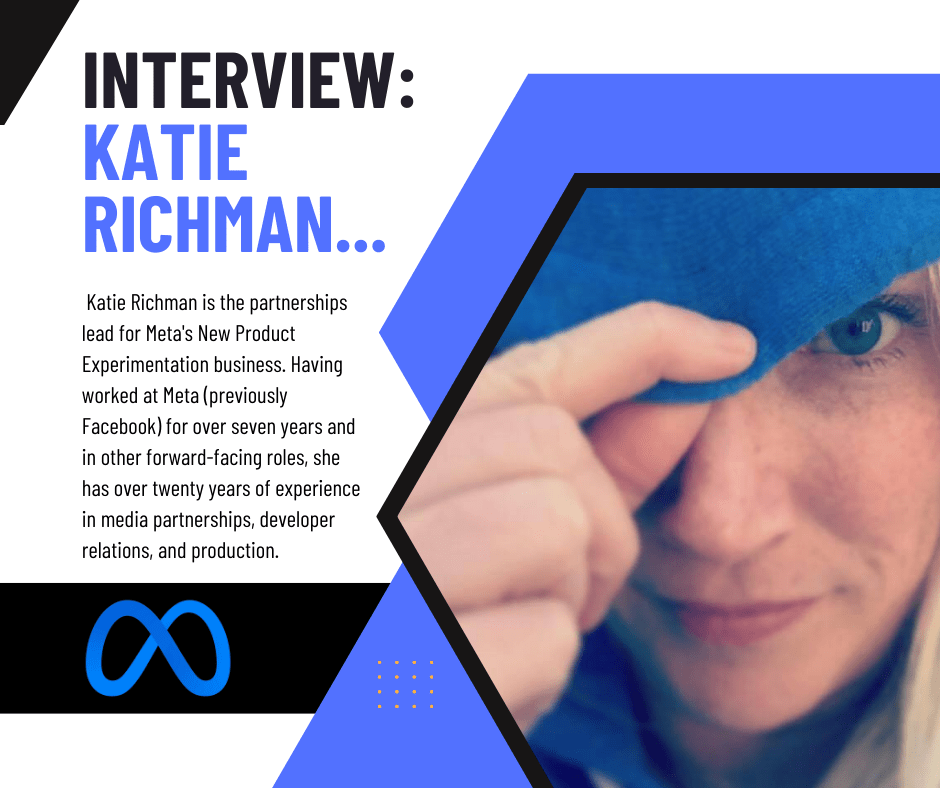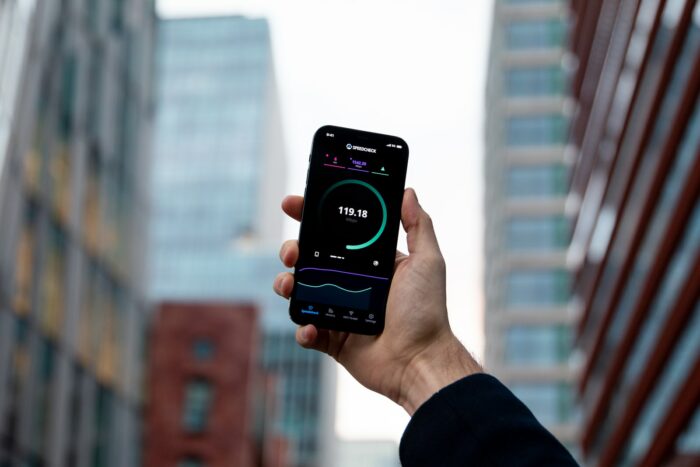Katie Richman is the partnerships lead for Meta’s New Product Experimentation business. Having worked at Meta (previously Facebook) for over seven years and in other forward-facing roles, she has over twenty years of experience in media partnerships, developer relations, and production.
She is also the author of “The Metaverse Manifesto,” a Medium blog outlining what she believes the direction of metaverse development to be.
Interestingly Katie began writing them after reading about Bored Apes:

“I started writing it because I was reading a lot about Bored Apes – and the argument against Bored Apes being the “right-click save as” argument– why can’t I put that image up on my screen too? It’s just a JPEG!”
“And it reminded me of working on the early days of social media at ESPN and hearing how no one cares about social media – so it was reminiscent. I was writing this initially as a long internal Meta Workplace post to share with some teammates and partners working in the space.”
“Then I decided – I’m just going to post this externally. And I’m so glad I did. I made sure it was appropriate for an outside-Meta audience and then hit “publish.”. But what’s resulted from my metaverse blog is conversations like these. I love that I’m meeting people worldwide now, and we all have a passion for the future of the internet.”
Katie wanted to highlight how the metaverse and web3 are this huge opportunity for more organic– and less intrusive–connectivity in our lives.:
“The metaverse is not a place you go to in VR. It’s an evolution of the internet, And it’s our next frontier of communication – a phase where technology’s ambient and everywhere. We get to put down these little computers we hold in front of our faces all day long today and truly CONNECT with each other.
“Technology’s there for us when we want it. And soon we’ll have this connectivity everywhere.”
To illustrate her point further, Katie reminisced about a Facebook team meeting over seven years ago, when an intern asked Katie’s boss, Mark Zuckerberg, about the future of Facebook:
“So every Friday, Mark and his team would do a live Q&A with the Facebook staff. This was when the company was mostly in person in Menlo Park. It was open to everyone at Facebook, and almost everyone would attend. You could grab a beer, go in there, and have the opportunity to ask live questions to leadership at the mic. He would make a couple of announcements, but most of it was truly live.”
“So Mark is at the front mic, and people would go up to ask questions. At the end of the summer, the interns would always line up and take the opportunity to ask a question.”
“I remember I was half-listening / half-working, and one intern asked: “Where do you see the company in 10 years?” It was such a basic question, and I think we expected a boilerplate answer. But his answer has been something that has stuck with me ever since. Mark said that he had a vision of a world where people looked up from their devices. I feel like eight years later; we’re finally getting to realize that vision with the metaverse.”
“What I appreciate about my boss is his conviction. He has a lot of vision. He doesn’t let opinions sway where he’s going. I’ve always found myself a big believer in his visions and plans for the future.”
“The metaverse – or web3 – is about looking up from our devices and connecting with each other as human beings. Especially post-COVID. Given the political climate, at least in the United States, I can’t think of anything we need more than that.”
Leaning on her experience as ex-social media director at ESPN, Katie explained that she believes the future of technology and our experiences are all about layers of reality – a sort of reality-hybrid state:
“I think it’s layers of reality. So I worked at ESPN as a social media director for a bit, and we were one of the first media companies to sell social media integrations during live broadcasts as part of packages for things like College Football.”
“We always made sure that the fan – the hardcore fan of that sport – can just watch the game if they want. There’s a large number of fans that don’t want you to add layers and social media to their game broadcasts. It’s all about providing those choices.”
“But then other more casual or social fans love these experience layers – things like hidden layers of commentary. An example: For someone who’s never been exposed to college football, what if those cans could be getting audio or SMS “layers” of commentary that break down plays, give info about the athletes, and share context when the announcer says something confusing.”
“I think a lot of our technological and communication future is about these user-controlled layers we can provide based on location or live entertainment. And then we have to be giving people the ability to control whether or not they want those layers.”
Clarifying further:
“I think some of these concepts are like corkscrews. I have a friend who built a mobile application based on check-ins and awarding location-based badges to users based on the places they’ve been.”
“To those of us old enough to remember early mobile and social, these layers and products can feel like they’re from a million years ago. All of the check-in and location-based social experiences had their moment like 15 years ago.”
” We’re coming back around to a very similar concept now, as we talk about web3 and the metaverse. Location-based interactions, games, and check-ins are coming back around. However, I don’t think of this as circular.
“I think of tech progress more as a corkscrew than a loop. It’s not a total repeat to focus on location-based experiences now. We’re dusting off mobile + location + social experiences, but the larger technology landscape is completely different. Thus the corkscrew. So it looks like you’re back where you started, but you’re at a new place due to a new tech landscape.”
Interoperability will also be a core part of the metaverse – and this was a point of contention for some readers when Katie launched her metaverse manifesto blog:
“It’s actually one of the things readers come at me the hardest with – or get angry about, and a common reason people give when they say why the metaverse won’t work…because all of these metaverse worlds, games, products are built on different infrastructure and don’t talk.”
“But I argue that we need to redefine interactivity. All of the techs can be different – there’s just an industry-wide commitment that all of our products will pivot off ONE user ID.”
“If we all could attach an agreed-upon blockchain node/id as the canonical user identity, then we can connect a person’s experiences all across the web (or metaverse).
“We could have a million front-end avatars or profiles – but these product-specific profiles ALL tie to this blockchain node id. And users need clear control over how they want to present themselves and what they want to share. Always.”
In closing, we discussed the need for better education in the industry and the need to educate on key issues such as data ownership:
“I want users to feel in control of their data and know to only provide this data if a platform gives them a good reason. I think we’ve gotten to the point where it feels like big tech is taking our data.”
“And what we need to do is educate people to understand that it’s a two-way street. If a user wants to get directions from Waze, for example, they HAVE to share their location. We need users to get this sort of education and guidance if we want to put people back in the driver’s seat with their data.”
Thus, the future metaverse realities present an infinite amount of opportunities for education and understanding of key issues associated with technology. Thank you, Katie, for taking this interview with us!
For more market insights, check out our latest Digital Twin news here.
















